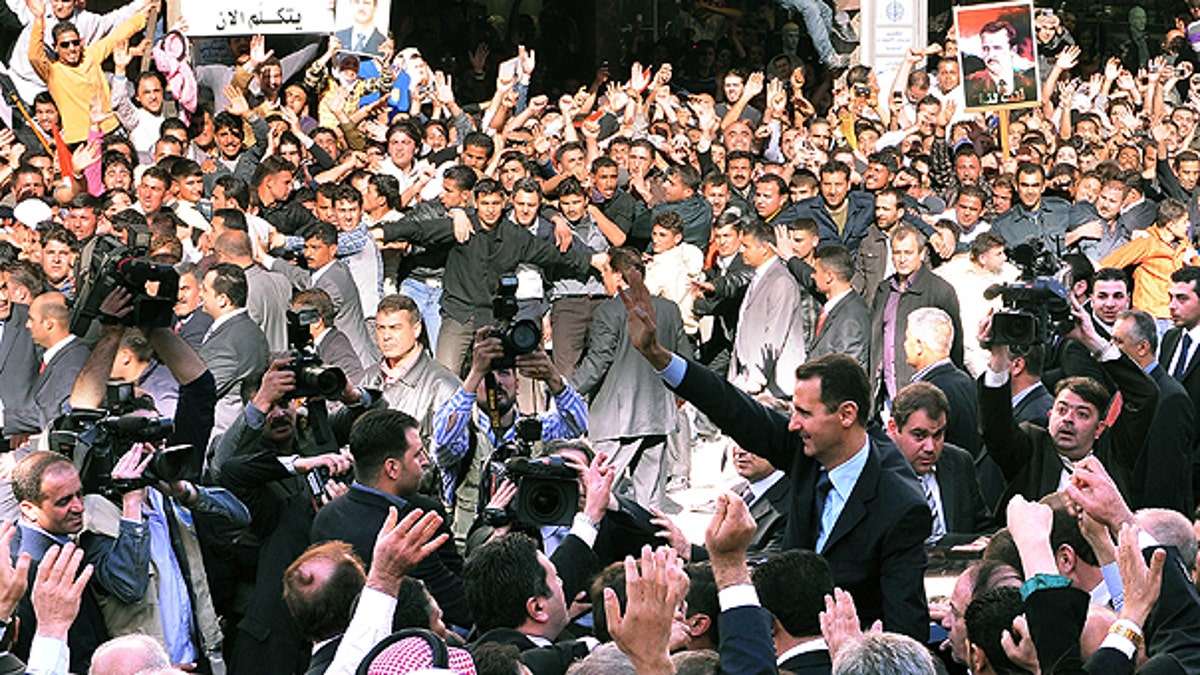
March 30: In this photo released by the Syrian official news agency SANA, Syrian President Bashar Assad, foreground right, waves to his supporters after he made a speech at the Parliament, in Damascus, Syria.
The Obama administration on Wednesday announced sanctions against Syrian President Bashar Assad and six other senior Syrian officials, taking an unprecedented step to isolate the regime over its brutal crackdown on protesters.
The sanctions mark the first time the administration has personally targeted Assad. The move, which comes ahead of a major address on Middle East policy President Obama plans to deliver Thursday, marks a stark turnaround for an administration that has tried to engage Assad and even referred to him as a reformer before the violence in that country escalated.
The administration last month hit three top Syrian officials and Syria's intelligence agency with financial sanctions. But as the crackdown continued and pressure increased in Washington for Obama to do more, the administration announced Wednesday that it would target the top members in the regime.
Obama, in a letter to congressional leaders informing them of the order, said the measures are aimed at addressing the "escalation of violence against the people of Syria," including attacks on protesters and arrests.
"The actions the administration has taken today send an unequivocal message to President Assad, the Syrian leadership, and regime insiders that they will be held accountable for the ongoing violence and repression in Syria," Treasury's Acting Under Secretary for Terrorism and Financial Intelligence David S. Cohen said in a statement. "President al-Assad and his regime must immediately end the use of violence, answer the calls of the Syrian people for a more representative government, and embark upon the path of meaningful democratic reform."
The sanctions target Assad, as well as the country's vice president, prime minister and other top officials. Under the terms of the sanctions, the U.S. would block their access to any property in the United States and prohibit anybody in the United States from "engaging in transactions with them."
The Treasury Department also marked 10 other individuals and entities for separate sanctions.
Obama had earlier returned an American ambassador to Damascus for the first time in years. But Assad's increasingly brutal crackdown left U.S. officials with what they saw as little choice but to abandon the effort to woo Assad and to stop exempting him from the same sort of sanctions already applied to Libya's Muammar al-Qaddafi.
The move comes as Assad said earlier Wednesday that his security forces had made mistakes during the two-month uprising and blamed poorly trained police at least in part for the crackdown that has killed more than 850 people.
On Tuesday, Secretary of State Hillary Clinton said she was increasingly alarmed by developments in Syria and called out Assad and his allies for failing to follow through on earlier pledges of reform.
"They have embraced the worst tactics of their Iranian ally, and they have refused to honor the legitimate aspirations of their own people in Syria," Clinton told reporters. "President Assad talks about reform, but his heavy-handed, brutal crackdown shows his true intentions."
Clinton's pointed accusation about Assad bearing personal responsibility for the repression came as the White House increased its criticism of his rule.
White House press secretary Jay Carney said democratic change had to come to Syria.
"The recent events in Syria we believe prove that the country cannot go back to the status quo ante," he said. "Syria's future will only be secured by a government that reflects the popular will of its people."
The Associated Press contributed to this report.




